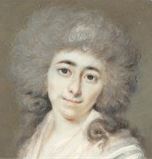 On 25th September 1799, shortly before 5 o’clock in the morning, the Wickhams woke up by the sound of guns. Were the French marching against Zurich again? William Wickham (1761 – 1840), England’s leading spy on the Continent, placed his wife Eleonore (1763-1836) under the care of his private secretary, the Count of St. George. He himself rode out reconnoitring the situation. Continue reading
On 25th September 1799, shortly before 5 o’clock in the morning, the Wickhams woke up by the sound of guns. Were the French marching against Zurich again? William Wickham (1761 – 1840), England’s leading spy on the Continent, placed his wife Eleonore (1763-1836) under the care of his private secretary, the Count of St. George. He himself rode out reconnoitring the situation. Continue reading
Results for Tag: Espionage
The Reichenbach Case – Industrial Espionage at Boulton & Watt
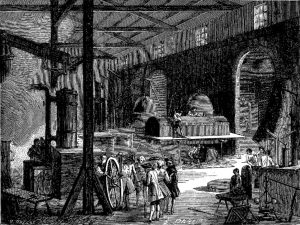 In the late 18th century, Bavaria was an economically backward state, heavily relying on agriculture. Bavaria’s Elector, Karl Theodor (1777-1799), though usually more interested in arts and philosophy than in state affairs, was aware of the problems arising from a weak industrial economy – especially with the French revolutionary army roaming Europe. Karl Theodor looked to England, a prosperous nation, and the number 1 in technical innovation.
In the late 18th century, Bavaria was an economically backward state, heavily relying on agriculture. Bavaria’s Elector, Karl Theodor (1777-1799), though usually more interested in arts and philosophy than in state affairs, was aware of the problems arising from a weak industrial economy – especially with the French revolutionary army roaming Europe. Karl Theodor looked to England, a prosperous nation, and the number 1 in technical innovation.
Plotting
Karl Theodor – probably inspired by his consultant, the smart Count Rumford – came up with a cunning plan: Continue reading
Jane Austen, the Captain and the Smugglers of a Tiny Island
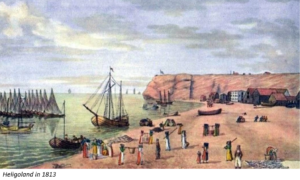 Captain Corbet James D’Auvergne could lay claim to knowing Jane Austen. The authoress mentions him in two letters to her sister Cassandra. Read more about Captain D’Auvergne connection to Jane Austen, and his achievements as Acting Governor of a tiny island in the North Sea called Heligoland.
Captain Corbet James D’Auvergne could lay claim to knowing Jane Austen. The authoress mentions him in two letters to her sister Cassandra. Read more about Captain D’Auvergne connection to Jane Austen, and his achievements as Acting Governor of a tiny island in the North Sea called Heligoland.
After a ball at the Dolphin Hotel in Southampton in December 1808, Jane Austen – proficient as ever in summing up a gentleman’s potential as a spouse – noted that Corbet James D’Auvergne was both a captain in the Royal Navy and a ship owner. The remark might have been a joke about husband-hunting, but the Captain was indeed a good catch for a lady looking for hero-material in her husband. Besides, he was still single. Any lady furthering her acquaintance with him should know, however, that he had his hands in large-scale smuggling.
Continue reading
The Lady is A Spy: Joanne Major and Sarah Murden Uncover the Intriguing Life of Rachel Charlotte Williams Biggs
 Rachel Charlotte Williams Biggs (c. 1763—1827) lived an incredible life in an age when the world was dominated by men. Joanne Major and Sarah Murden, dedicated historians and authors of several non-fiction books about the Georgian Age, have written an amazing biography about an extraordinary lady. In A Georgian Heroine: The Intriguing Life of Rachel Charlotte Williams Biggs, they uncover the bizarre but true story of Mrs. Biggs, who was a playwright and author, a political pamphleteer and a spy, working for the British Government. It’s a treat for me to present Sarah’s and Joanne’s post about Mrs. Biggs’ connection to the man who plotted to kill Napoleon.
Rachel Charlotte Williams Biggs (c. 1763—1827) lived an incredible life in an age when the world was dominated by men. Joanne Major and Sarah Murden, dedicated historians and authors of several non-fiction books about the Georgian Age, have written an amazing biography about an extraordinary lady. In A Georgian Heroine: The Intriguing Life of Rachel Charlotte Williams Biggs, they uncover the bizarre but true story of Mrs. Biggs, who was a playwright and author, a political pamphleteer and a spy, working for the British Government. It’s a treat for me to present Sarah’s and Joanne’s post about Mrs. Biggs’ connection to the man who plotted to kill Napoleon.
The Plot of the Infernal Machine Continue reading
Burn after Reading: Spying Secrets of the Regency Period – Guest Post by Sue Wilkes
I am delighted to have Sue Wilkes, acclaimed author of several social history books and family history guides, as guest writer at Regency Explorer. In her newest book, Regency Spies, Sue explores the secret histories of Britain’s rebels, radicals and revolutionaries during the Regency period. It’s a treat for me to present Sue’s insightful post about spies and revolutionaries’ secret means of communication:
Shoe, Code & Coach: Spying Secrets
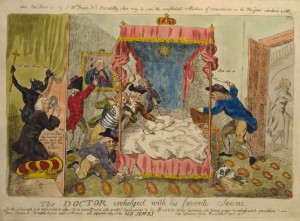
Republican cleric Dr. Richard Price spying on Marie Antoinette at Versailles as she is assailed by ruffians. Isaac Cruikshank, c.1790. Courtesy Library of Congress.
The Regency era was one of great paranoia and suspicion. Britain was at war with France, and Ireland was a hotbed of rebellion. So this was a busy time for the government’s spies on the domestic front as well as abroad.
Rebels knew that their mail was likely to be intercepted, so they went to great lengths to circumvent the authorities. Assuming an alias was an obvious trick. Messages between groups were conveyed face-to-face, or letters were sent by trusted couriers. In the late 1790s, it was reported that at least one dissident Irishman took secret messages from England to Ireland using a secret compartment in one of his shoes. The letter was placed in the cavity, and covered in strong paper to protect it. Then the sole of the shoe was sewn back on again. Continue reading
Writer’s Travel Guide: The Jersey Connection
In this post:
– Working as an agent in the 18th century: Tasks and Methods
– Deadly Dangers
– A Thorn in Napoleon’s Side
Angelique Le Tourneur was a spy. She looked like an ordinary fisherwoman, and her little boat sailing from village to village along the French coast was loaded with fish. But Angelique belonged to a network of spies that was operated from the Isle of Jersey for 18 years.
What Would Have Been Your Role at the Congress of Vienna 1814/1815?
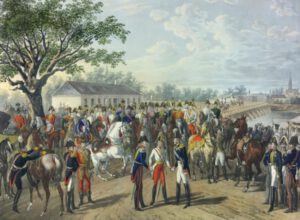 Vienna, 1814. 271,000 people live in the capital of the Austrian Empire. The city is going to host one of the major political events of the early 19th century: The Congress of Vienna. The heads of the five reigning dynasties, representatives from 216 noble families and their entourage travel to Vienna. 16.000 visitors are already arriving in September. More are to follow: plenipotentiaries, ministers, noblemen, servants, musicians, artists, merchants, fortune-hunters and card sharps.
Vienna, 1814. 271,000 people live in the capital of the Austrian Empire. The city is going to host one of the major political events of the early 19th century: The Congress of Vienna. The heads of the five reigning dynasties, representatives from 216 noble families and their entourage travel to Vienna. 16.000 visitors are already arriving in September. More are to follow: plenipotentiaries, ministers, noblemen, servants, musicians, artists, merchants, fortune-hunters and card sharps.
Have a glimpse behind the scenes
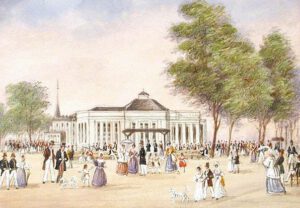 Organising the Congress is a huge task. Regency Explorer takes you behind the scenes as either the Head of the Police Ministry or the Master of Ceremonies and tells you more about the history of the Congress and the tasks that had to be fulfilled.
Organising the Congress is a huge task. Regency Explorer takes you behind the scenes as either the Head of the Police Ministry or the Master of Ceremonies and tells you more about the history of the Congress and the tasks that had to be fulfilled.
First, find out in which role you would have fitted best at the Congress by answering the three questions below. Count your points to get a proper result, and then read on to learn more about the challenges the real historical persons of Baron Hager, Head of the Police Ministry, and Count Trauttmansdorff, Master of Ceremonies, had to face.

